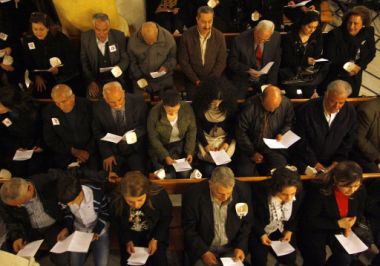Why the UK media are not that bothered about Syrian Christians

In a post entitled Disremembering Syria, conservative Christian blogger Archbishop Cranmer bewails the apathy in the UK media about the escalation in the persecution of Christians in Syria. But the explanation for the relatively low level of coverage is fairly straightforward: moral outrage is the fruit of morality.
Christianity is not a strongly influential moral force anymore in this country whereas LGBT rights are a major moral concern for opinion-formers, particularly in the BBC, Channel 4 and national newspapers such as the Guardian and the Times. That is why the persecution of overseas Christians does not earn the same level of coverage as the recent anti-gay laws in Russia, Nigeria and Uganda.
That does not mean that British voters share the same level of concern about LGBT issues as the metropolitan media and political establishment. How electorally helpful to the Conservative Party in 2015 will be its leader's championship of same-sex marriage is surely very uncertain. Arguably, it is one of the factors that is drawing socially conservative voters, both on the Right and on the Left, towards Ukip.
But opinion-formers are certainly right to perceive the UK's older Christian denominations in their representation of Christianity as a weak moral force. In their recent pronouncements against the Government's welfare reforms, Anglican and Roman Catholic leaders in particular have appeared out of step with the moral concerns of many working voters. The older churches are not gaining social influence by underplaying the teaching of Jesus Christ in the New Testament about the moral importance of earning one's own living when one is capable of doing so and thus not being dependent on the hard work of others.
The plight of overseas Christians used to be a major concern for the British electorate. The suffering of Bulgarian Christians at the hands of the Ottoman Turks was a significant factor in the victory of William Gladstone's Liberals over the Conservatives in 1880. The joke by the Conservative leader Benjamin Disraeli that the Turks 'seldom, I believe, resort to torture, but generally terminate their connection with culprits in a more expeditious manner' may have enhanced his reputation as a mordant wit but was out of kilter with the sensibilities of a highly Christianised electorate.
However, despite the fact that 21st century British politicians and journalists are not especially morally outraged by the persecution of Christ's people in Syria, Archbishop Cranmer is absolutely right to draw attention to their suffering at the hands of militant Islamists. So the last word ought to go to Bishop Antoine Audo, the Chaldean Bishop of Aleppo, whom Cranmer quotes from an article in The Telegraph:
"Here in Syria, where St Paul found his faith, many churches stand empty, targets for bombardment and desecration. Aleppo, where I have been bishop for 25 years, is devastated. We have become accustomed to the daily dose of death and destruction, but living in such uncertainty and fear exhausts the body and the mind. We hear the thunder of bombs and the rattle of gunfire, but we don't always know what is happening. It's hard to describe how chaotic, terrifying and psychologically difficult it is when you have no idea what will happen next, or where the next rocket will fall...Our faith is under mortal threat, in danger of being driven into extinction, the same pattern we have seen in neighbouring Iraq."











